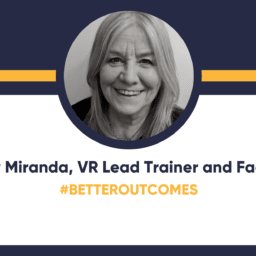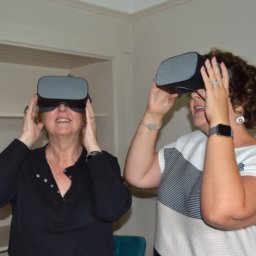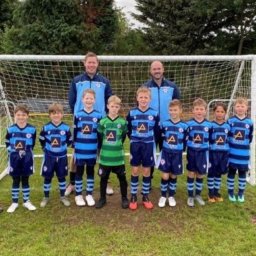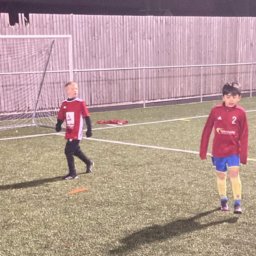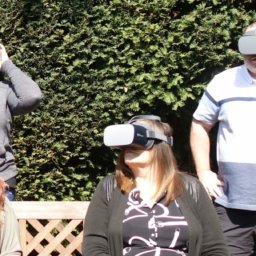This week we sat down with our new VR Service Manager, Abby Cooke, who shared insight into her role at Antser and what drew her to working with us.
What is your role at Antser?
I am the VR Service Manager, so I will be supporting professionals to embed the Antser Virtual Reality (VR) programme into practice with our partners. From linking up with them in meetings, to touching base on how they are using the Virtual Reality programme and exploring any issues with which we could be supporting them. I will also be connecting them with other partners who use the VR programme, to grow their use of VR into their services and share good practice. Additionally, I will be co-delivering training. This is the training that we provide to partners to certify them in using the VR programme. I’m also a part of the Subject Matter Expert group, which is a great space to reflect on developments with other practitioners.
Why did you choose Antser?
I joined Antser in March, and prior to joining the team, I was a social worker for 10 years. Just before leaving my last job, I was an adoption support team manager and we actually started using VR in 2019.
I was one of the managers that helped develop VR within our services and I really fell in love with the tool and loved how it could bring about positive change. Alongside my love of VR and working closely with Alison, when I saw the role come through it is just one of those opportunities you don’t see often in social work – to develop a tool that could enhance professionals’ practice and support families.
Within social work and child protection, to have a tool where it doesn’t feel like you are shaming the family but where they can see the experience through a child’s eyes, it feels a lot different to when we try and explain it. Sometimes it can come across that we are this professional who is being really negative and they feel like it is a personal attack, so to have a tool you can use alongside supporting families is massive. I feel it is also great for families where they have additional needs, as having a visual aid this can support embed training they may have attended. For professionals it is a great reflective tool.
How did you get into your chosen career and why did you choose it?
When I was in school, they didn’t have many opportunities to understand which career path you may want to take, it was very much you do your GCSEs and then some sixth form courses that didn’t really take you anywhere. I always knew I wanted to be in a profession that was related to caring for others, but I automatically thought that was nursing. After my A-Levels I went to University to become a Nurse but realised after a year, that this wasn’t the profession for me. Once I learned more about social work, that’s where I changed from the health sector to social. After that, I went to do an access course at college to make sure that it was something I was interested in, and from there I realised this was where my passion lay.
Social care is such a massive area, and I knew I wanted to understand a child and family’s perspective, why certain situations happen and how you can bring about positive change. As a social worker that is quite hard as you often are not seen as the support.
When I qualified as a Social Worker, the services were very much combined, so you had child protection, child in need, children in care and adoption as one team. Once they started to specialise and branch off, I went into adoption. Initially being the social worker for children with a plan of adoption, but then moving into supporting adoptive families post Adoption Order, and assessing Prospective Adopters. In the last two years I’ve been an Adoption Team Manager for a Regional Adoption Agency.
I’ve taken a number of paths in my career but kept coming back to adoption. I think in adoption you get more time to step back and reflect, and understand the real impact of early childhood trauma and how we can support children, but also their families, so that’s a real interest of mine. So, when this VR tool came around, I knew immediately this would really support people greatly.
What has been the biggest challenge in your career?
In my career in social work, I have found one of the hardest challenges has been removing children, because you never want to remove a child from their family. Since becoming a parent, you really understand and appreciate the impact of that on the child and for the parents a whole lot more.
In my career, trying to understand your pathway, where you belong in all the social work world and where your interests are has been hard.
Once you’re in social work, you find all these other interests. For example, when you go from a social worker to a manager, it’s like another world. When I stepped up to become a manager, that was a massive challenge because you see the world of social care through a completely different lens, but with that it is really interesting. I found passions I didn’t realise I had, including supporting staff, social workers and social work support officers to be confident in themselves as professionals.
When I started my management journey, the adoption agency I was with was transitioning to a Regional Adoption Agency, where four local authorities came together to be one. That was very challenging as it was four different ways of working and all to achieve the same goal, so there was a transition through this but they are doing great and delivering an amazing service.
There have been quite a few different challenges personally and professionally during my career, but it’s been a very interesting journey and it’s never boring.
In regard to your new role, what are you most excited about?
I would really love to focus on supporting the partners to get into the nitty gritty of using VR and actually helping them to integrate VR into their practice.
Once there is confidence around using VR and knowing how to start, people will just run with it. I am looking forward to actually evidence-basing that and making sure we get evaluations back to further understand the impact it’s having.
I think it will just strengthen the VR programme, strengthen practice, and make a huge difference – so getting into the nitty gritty is quite what I’m excited to do.
Learn more about our Virtual Reality programme here.



